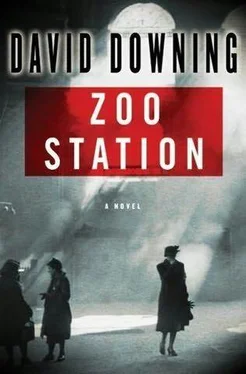David Downing - Zero Station
Здесь есть возможность читать онлайн «David Downing - Zero Station» весь текст электронной книги совершенно бесплатно (целиком полную версию без сокращений). В некоторых случаях можно слушать аудио, скачать через торрент в формате fb2 и присутствует краткое содержание. Жанр: Шпионский детектив, на английском языке. Описание произведения, (предисловие) а так же отзывы посетителей доступны на портале библиотеки ЛибКат.
- Название:Zero Station
- Автор:
- Жанр:
- Год:неизвестен
- ISBN:нет данных
- Рейтинг книги:5 / 5. Голосов: 1
-
Избранное:Добавить в избранное
- Отзывы:
-
Ваша оценка:
- 100
- 1
- 2
- 3
- 4
- 5
Zero Station: краткое содержание, описание и аннотация
Предлагаем к чтению аннотацию, описание, краткое содержание или предисловие (зависит от того, что написал сам автор книги «Zero Station»). Если вы не нашли необходимую информацию о книге — напишите в комментариях, мы постараемся отыскать её.
Zero Station — читать онлайн бесплатно полную книгу (весь текст) целиком
Ниже представлен текст книги, разбитый по страницам. Система сохранения места последней прочитанной страницы, позволяет с удобством читать онлайн бесплатно книгу «Zero Station», без необходимости каждый раз заново искать на чём Вы остановились. Поставьте закладку, и сможете в любой момент перейти на страницу, на которой закончили чтение.
Интервал:
Закладка:
“The Knauer boy,” McKinley said, once they were ensconced in Russell’s two armchairs. “I don’t think his parents gave him a Christian name. He was blind, had only one arm, and part of one leg was missing. He was also, supposedly, an idiot. A medical idiot, I mean. Mentally retarded. Anyway, his father wrote to Hitler asking him to have the boy killed. Hitler got one of the doctors employed by the KdF to confirm the facts, which they did. He then gave the child’s own doctors permission to carry out a mercy-killing. The boy was put to sleep.” He paused to re-stoke his pipe.
“That’s a sad story,” Russell said cautiously.
“There’s two things,” McKinley said. “Hitler has never made any secret of his plan to purify the race by sterilizing the mentally handicapped and all the other so-called incurables. And the Nazis are always going on about how much it costs to keep all these people in asylums. They actually use it as an example in one of their school textbooks-you know, how many people’s cars you could build with what it costs to feed and clothe ten incurables for a year. Put the two things together and you get one easy answer: Kill them. It purifies the race and saves money.”
“Yes, but…”
“I know. But if the Knauer boy is expendable, why not the others? About one hundred thousand of them, according to the latest figures. Tell the parents they’re doing it to cut short the child’s suffering, give them an excuse not to have the problem anymore. In fact, don’t even tell the parents. Spare their suffering by saying that the child died of natural causes.”
“One hundred thousand of them?”
“Perhaps not, but…”
“Okay, it sounds feasible. It sounds like the Nazis, for Christ’s sake. But are they actually doing it? And if they are, do you have any proof that they’re doing it?”
“There are all sorts of indications…”
“Not good enough.”
“Plans, then.”
“On paper?”
“Not exactly. Look, will you come and see this woman with me?”
Russell knew what the sensible answer was, but McKinley had him hooked. “Okay,” he said, checking his watch and realizing that he’d be late for meeting Effi.
Once out on Lindenstrasse he decided to spend some of his anticipated earnings on a cab. As it swung around the Belle Alliance Platz and headed up Kцniggrдtzerstrasse toward Potsdamer Bahnhofplatz, he watched the people on the sidewalks and wondered how many of them would protest the mercy killing of 100,000 children. Would that be one step too far, or just another milestone in the shedding of a nation’s scruples?
Russell didn’t expect to find many similarities between Tyler McKinley and Albert Wiesner. On the one hand, a boy from a rich family and country with a rewarding job and instant access to a ticket out of Nazi Germany. On the other, a boy without work or prospects of any kind, whose next forwarding address was likely to be Sachsenhausen. Russell, however, soon found himself comparing the two young men. The characters and personalities of both of them had been formed in successful families and, it seemed, in reaction to powerful fathers. Both seemed blessed with enough youthful naivete to render them irritating and likable in turn.
Frau Wiesner produced her son at the end of Friday’s lesson. For his mother’s and sisters’ sake the boy made a token effort to mask his sullen resentment at this unnecessary intrusion on his time, but once out of the door he swiftly abandoned any pretence of amiability.
“Let’s get some coffee,” Russell said.
“No cafйs will serve us,” was Albert’s reply.
“Well, then, let’s go for a walk in the park.”
Albert said nothing, but kept pace at Russell’s side as they strolled down Greifswaldstrasse toward the northern entrance of the Friedrichshain, the park which gave the whole district its name. Once inside the main gates Russell led them past the Mдrchenbrunnen, a series of artificial waterfalls surrounded by sculptured characters from fairytales. He had brought Paul to see it several years ago, when Hansel and Gretel-the figures in the foreground-could still conjure up nighttime terrors of wicked witches, as Ilse had bitterly complained on the following day.
Albert had a more topical agenda in mind. “The witch must have been Jewish,” he said.
“If she wasn’t then, she will be now,” Russell agreed.
They walked on into the park, down a wide path beneath the leafless trees. Albert seemed unconcerned by the silence between them, and made a point of catching the eyes of those walking in the opposite direction.
Russell had mentally rehearsed a few lines of adult wisdom on the U-bahn, but they’d all sounded ridiculous. “Your mother wanted me to talk to you,” he said at last. “But I have no idea what to say. You and your family are in a terrible situation. And, well, I guess she’s frightened that you’ll just make things worse for yourself.”
“And them.”
“Yes, and them.”
“I do realize that.”
“Yes…” This is a waste of time, Russell thought. They were approaching one of the park’s outdoor cafйs. “Let’s have a coffee here,” he said.
“They won’t serve me.”
“Just take a seat. I’ll get them.” He walked up to the kiosk window and looked at the cakes. They had mohrenkopfen, balls of sponge with custard centers, chocolate coats, and whipped cream hats. “Two of them and two coffees,” he told the middle-aged man behind the counter.
The man was staring at Albert. “He’s a Jew,” he said finally, as if reaching the end of an exhaustive mental process. “We don’t serve Jews.”
“He’s English,” Russell said. “As am I.” He showed the man his Ministry of Propaganda accreditation.
“He looks Jewish,” the man said, still staring at Albert, who was now staring back. Why don’t you just take out your circumcised prick and wave it at him, Russell thought sourly. “He may be Jewish for all I know,” Russell told the man, “but there’s no law against serving English Jews.”
“There isn’t?”
“No, there isn’t.”
The man just stared at him.
“Do you need to hear it from a policeman?”
“Not if you say so.” He gave Albert one final glare and concentrated on pouring out the coffee.
God help us, Russell thought. He could understand Albert’s reaction, no matter how counterproductive it was. But this man-what was he so annoyed about? There were no SS men lounging at his tables, no ordinary citizens on the brink of racial apoplexy. Why did he care so much that a Jew was sitting at one of his rusty tables? Did he really think Jewish germs would rub off on his cups and saucers?
The coffee was spilled in the saucers, but it didn’t seem worth complaining. He carried them back to the table, where Albert was now slouched in his chair, legs splayed out in defiance. Russell resisted the temptation to say “sit up in your chair” and handed him a mohrenkopf. His eyes lit up.
They concentrated on eating for a few minutes.
“Do you really think there’s any chance we’ll get visas?” Albert asked eventually, allowing the merest hint of hope to mar his cynicism.
“Yes,” Russell said, with more conviction than he felt. “It may take a while, but why not? The Nazis don’t want you, so why shouldn’t they let you go?”
“Because they’re even more interested in hurting us?”
Russell considered that. It had, unfortunately, the ring of truth. “The way I see it,” he said, “you don’t have many options. You can fight back and most likely end up in a camp. Or dead. Or you can try and work their system.”
Albert gave him a pitying look. “There are half a million of us,” he said. “At the current rate it’ll take seven years for us all to get visas.”
Читать дальшеИнтервал:
Закладка:
Похожие книги на «Zero Station»
Представляем Вашему вниманию похожие книги на «Zero Station» списком для выбора. Мы отобрали схожую по названию и смыслу литературу в надежде предоставить читателям больше вариантов отыскать новые, интересные, ещё непрочитанные произведения.
Обсуждение, отзывы о книге «Zero Station» и просто собственные мнения читателей. Оставьте ваши комментарии, напишите, что Вы думаете о произведении, его смысле или главных героях. Укажите что конкретно понравилось, а что нет, и почему Вы так считаете.












